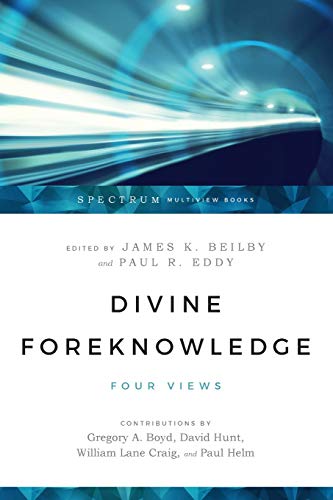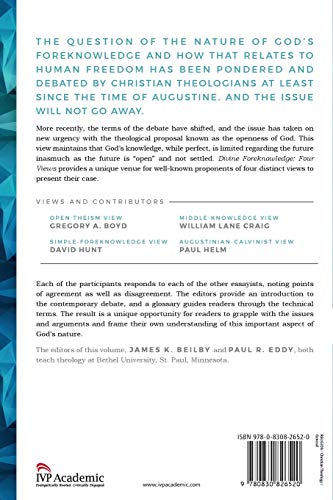Divine Foreknowledge: Four Views
₱1,394.00
Product Description
The question of the nature of God’s foreknowledge and how that relates to human freedom has been pondered and debated by Christian theologians at least since the time of Augustine. And the issue will not go away. More recently, the terms of the debate have shifted, and the issue has taken on new urgency with the theological proposal known as the openness of God. This view maintains that God’s knowledge, while perfect, is limited regarding the future inasmuch as the future is “open” and not settled.
Divine Foreknowledge: Four Views provides a venue for well-known proponents of four distinct views of divine foreknowledge to present their cases: Gregory A. Boyd of Bethel College presents the open-theism view, David Hunt of Whittier College weighs in on the simple-foreknowledge view, William Lane Craig of Talbot School of Theology takes the middle-knowledge view, and Paul Helm of Regent College, Vancouver, presents the Augustinian-Calvinist view. All four respond to each of the other essayists, noting points of agreement and disagreement. Editors James K. Beilby and Paul R. Eddy introduce the contemporary debate and also offer a conclusion that helps you evaluate the relative strengths and weaknesses of each view. The result is a unique opportunity to grapple with the issues and arguments and frame your own understanding of this important debate.
From Publishers Weekly
The recent evangelical debate about divine foreknowledge has been compared to the inerrancy debate of the 1970s because of its heatedness; this collection attempts to offer several viewpoints on the basic controversies (i.e., what did God know, when did he know it and do human beings really have free will?). But in bringing together these four authors Gregory Boyd with the open view, David Hunt with the simple-foreknowledge view, William Lane Craig with the middle-foreknowledge view and Paul Helm defending the Augustinian-Calvinist view the collection illustrates another similarity with the inerrancy debate: a mind-numbing complexity of argument. The editors have sought “to make this book accessible to educated laypeople and college students who have had a first course in theology or philosophy.” While Boyd’s essay is very accessible, the others are filled with technical terms (“while it seems clear that intramundane causation is transitive”) and a puzzling tendency to speak in algebraic variables (“If it is accidentally necessary before X is even born that X will do A, then X never has it in his power to do other than A…”). Needing over seven pages of glossary, this book is unlikely to find a wide audience, but it will still prove useful for those seminarians and clergy who wish to get several different perspectives on the debate.
Copyright 2001 Cahners Business Information, Inc.
About the Author
James K. Beilby (Ph.D., Marquette University) is professor of systematic and philosophical theology at Bethel University in St. Paul, Minnesota. His books include
Why Bother With Truth? (with David Clark),
Divine Foreknowledge: Four Views and
The Meaning of the Atonement: Four Views (both with Paul Eddy),
Naturalism Defeated?, For Faith and Clarity and
Epistemology as Theology. His articles and essays have appeared in such publications as
Faith and Philosophy, Philosophia Christi, Religious Studies, International Journal for Philosophy of Religion, American Journal of Theology and Philosophy, Sophia and
Journal of the Evangelical Theological Society.
Paul R. Eddy (Ph.D., Marquette University) is Professor of Theology at Bethel University in St. Paul, Minnesota. His books include
John Hick’s Pluralist Philosophy of World Religions (Ashgate),
Across the Spectrum: Understanding Issues in Evangelical Theology (with G. A. Boyd, Baker) and
Divine Foreknowledge: Four Views (with James Beilby IVP).
Gregory A. Boyd (Ph.D., Princeton Theological Seminary) is a pastor at Woodland Hills Church in St. Paul, Minnesota. Previously, he was a professor of














